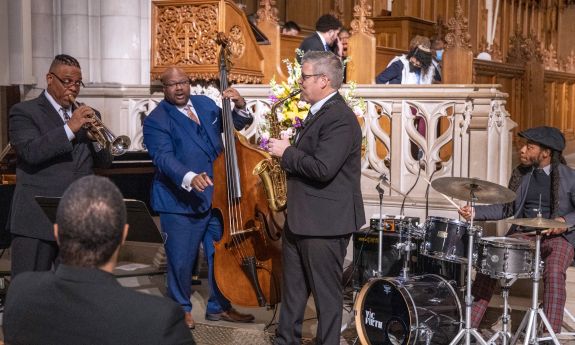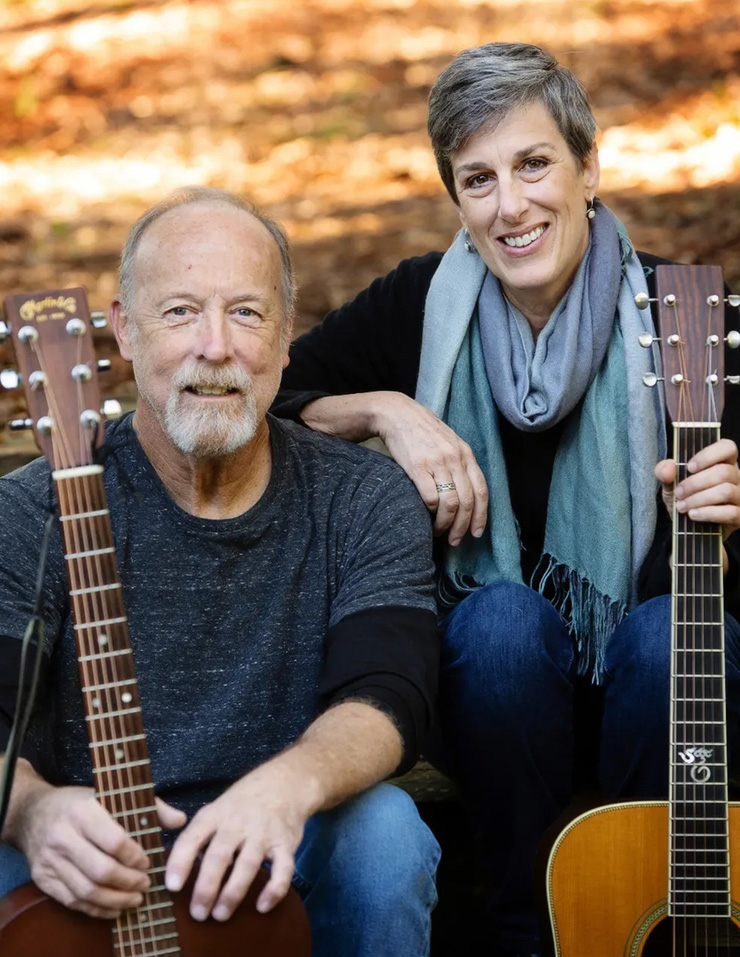Striking a Chord in Life and Work
Musicians at Duke find harmony between their music and professional careers

“Both music and math you freedom, but they also gives you a framework,” Loksztejn said. “That typically works very well for people who are in the medical field or are scientists – people who have a very organized way of thinking about life.
“It just goes together. I don’t know what it is. It’s just really intertwined. I feel like music makes me less anxious as a scientist. and helps me troubleshoot scientific problems better.”
Qualities learned as a musician translate to life and work, in general, according to studies. Having a background in music can help foster better teamwork and deep listening skills, encourage responsibility and timeliness and cultivates creativity, among other traits.
How do musicians make successful employees?
Here are a handful of ways to contemplate how playing music makes you a well-rounded person as you watch the Grammy Awards on Feb. 2.
Learning individual responsibility

One bit of wisdom that John V. Brown, Vice Provost for the Arts and Director of the Jazz Program at Duke, often reminds his students is that there is a distinction between practicing and rehearsing.
Practicing is what you do individually, working on perfecting your piece of the bigger puzzle.
Rehearsing is what happens when everyone comes together with their practiced parts fully explored.
“You're there having prepared your part, and then you're working with everybody else who has also done the same to make the effort effective,” Brown said.
In other words, there’s an individual responsibility for the greater good of the team.
Loksztejn has seen that firsthand in her experiences with the Durham Medical Orchestra.
“There is no ‘solo’ in the orchestra,” she said. “We are one thing, you're a piece of a bigger puzzle.”
Teamwork makes the dream work
Isabel Valls is a part of the Duke Office of Information Technology’s band, Colonel Panic and the Open Tickets. But when on her own, she primarily plays original singer-songwriter music, accompanying her vocals with acoustic guitar both individually and with the duo Barry and Isabel.
When the OIT band formed in Fall 2024 to play at a couple department parties, it was a mashup of musicians with varying skills and interests: a metal guitarist, a virtual reality specialist on keyboard and a drummer who she didn't know played the drums even after working in the same department for many years.

Valls learned to mesh her music with the others – leaning into their teamwork skills to create a unified sound.
“It was just a fun experience and even though everybody's kind of in a different place musically, we had a really good time,” Valls said.
Eric Chaiken, a counselor for Personal Assistance Service (PAS), studied trumpet performance for his undergraduate degree, and is thankful for all the ways playing the instrument helped with the listening skills he now uses every day.
“A lot about being a musician is just listening – listening to what like I'm doing and what others are doing and what we're doing together,” he said. “There's listening, and then there's genuinely listening. And I think when you’re genuinely listening, you're pausing and listening with a sense of curiosity.”
Brown says he’s seen both colleagues and students have lightbulb moments when playing in groups. They often see how their instrument fits in with the larger picture.
“I think that's where a lot of people realize who they are – by how they show up in ensembles,” Brown said.
Brown’s ultimate teamwork achievement might be a Grammy nomination from 1995, for his performance and co-writing on Nnenna Freelon’s “Shaking Free.”
It’s all in the details
Musicians often learn the value of timeliness and precision. Both skills are required when performing, ensuring that you execute your section of the score on time to mesh with the larger unit. Understanding the importance of the tiniest details is vital.

“Music forces you to be super detail-oriented, and it also forces you to take the detail to a bigger picture,” Loksztejn said. “Because at the end of the day, nobody pays that much attention to how you played that one passage. Everybody cares how you play the entire piece.
“And the same thing is with science,” Loksztejn continued. “You're digging in depth into this one detail, and then you have to define how your discovery fits in the bigger picture.”
Valls says her career as a Senior IT Analyst for OIT has helped her be a better musician. Her attention to detail in her work translates to that same ability to manage the small tasks required of managing her music career.
“A lot of musicians hate the idea of having to maintain a website or create a mailing list,” Valls said. “Because of my experience, those things aren't onerous for me.”
Creativity within a framework
Brown said he was drawn to jazz because of the creativity allowed within the framework of a piece during improvisational sections.
“There’s a level of independence and individuality that is required of you in that setting that is a different kind of freedom,” he said. “When you get to the improvisation part, which is the meat of what jazz music is, that is you composing in the moment and that is everybody else in the band responding to what you play.”
In a recent survey, 77% of respondents said that creativity is one of the top transferrable skills from music education to an employment setting. Professionalism, self-direction and attention to detail were the top traits cited.
Loksztejn simply sees how music helps make her life fuller.
“We go to rehearsals to be separated mentally from the day-to-day,” Loksztejn said. “At the same time, it helps you understand the day-to-day better. You might think you’re doing something entirely different, but it helps you with whatever it is you need to do Monday through Friday.”
Send story ideas, shout-outs and photographs by writing working@duke.edu.
Follow Working@Duke on X (Twitter), Facebook and Instagram and subscribe on YouTube.